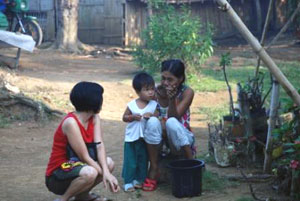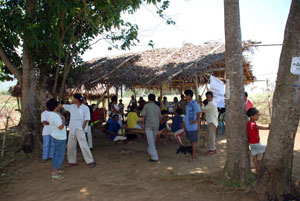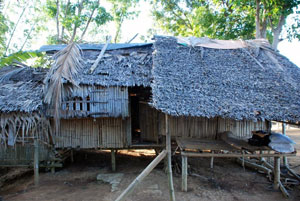Danilo Reyes
The island of Negros is divided into two dominant languages–Cebuano in the east and Hiligaynon in the west. The accent, words and the meaning of the spoken word in these languages is unique and different in their own way. However, to a certain extent a Cebuano speaker like me, with some basic knowledge of Hiligaynon, can get a sense of what is being said.
 A prominent historian described Filipinos as having ‘barriotic’ attitudes. Barriotic of course comes from the term barrio (a subsection of a village) or the attitude of being ‘regionalistic’ (a regional division of group of islands of the archipelago). Both these terms describe a person who is so deeply focused on the way of life, people and the problems of his own community that they do not look at the bigger picture of the country–or even consider the idea that, despite the differences in our language, culture, tradition and way of life, we all are Filipinos.
A prominent historian described Filipinos as having ‘barriotic’ attitudes. Barriotic of course comes from the term barrio (a subsection of a village) or the attitude of being ‘regionalistic’ (a regional division of group of islands of the archipelago). Both these terms describe a person who is so deeply focused on the way of life, people and the problems of his own community that they do not look at the bigger picture of the country–or even consider the idea that, despite the differences in our language, culture, tradition and way of life, we all are Filipinos.
However, in the context of the people of Negros, to speak their own language does not mean one is barriotic or regionalistic. It is rather something that makes them feel free. It is the ability to express their anger, demand what they want in their grievances and to explain their problems in their own language which they firmly believe makes them free. This was a local’s opinion as to why, despite the strong dominance of Spanish since colonial times, Hiligaynon and Cebuano have remained the spoken languages amongst the inhabitants of Negros.
It explains perhaps why the people in the island remain dominantly Hiligaynon and Cebuano speaking. These are now the languages that even the local landlords and the elite speak today. These languages continued to survive and be spoken, not because they are taught in schools or are part of the education as mediums of language but because of the struggle of the people for their own survival as well. They consider their language to be an external expression of their freedom.
 When I was doing an interview with some of the local activists and families of the victims, I could feel what their language means to them. You could get the real sense and get a clear description, not only about the details of the case, but of the person or the victims’ suffering and fear as they spoke in their own language. As a gesture of respect to them and having a certain level of familiarity of Hiligaynon, I did my best to throw questions and discuss matters in Hiligaynon as much as possible. It even makes more sense because if you ask them in Cebuano, they would reply to you in Hiligaynon anyway. This is how strongly they feel about their own language. It means their survival and protection of their way of life.
When I was doing an interview with some of the local activists and families of the victims, I could feel what their language means to them. You could get the real sense and get a clear description, not only about the details of the case, but of the person or the victims’ suffering and fear as they spoke in their own language. As a gesture of respect to them and having a certain level of familiarity of Hiligaynon, I did my best to throw questions and discuss matters in Hiligaynon as much as possible. It even makes more sense because if you ask them in Cebuano, they would reply to you in Hiligaynon anyway. This is how strongly they feel about their own language. It means their survival and protection of their way of life.
Negros: Living in a colonial past
In the Spanish colonial times, there had been historical accounts of Filipinos being arrested either on fabricated charges or legally illogical charges to arrest, detain and to have them executed on purpose to sow fear amongst the society. The Filipinos were being displaced from their communities and had their lands taken by the Spaniards. This is the country’s image as described in history books during the colonial times. However, these are exactly the same realities that continue to persist in Negros today. But unlike in the past, the antagonists of today are Filipinos themselves, speaking their own local language and who exploit their own people.
After over a century of the country’s independence from Spain, the people in the island still live in the Spanish colonial past. After emerging from one of the local communities where I had a consultation what I felt at the time was as if I had witnessed a scene from the past. The local people do not feel that the government exists for them or that the government is looking after their welfare. The notion of state responsibility is either non-existent or hardly understood by them.
When I posed the question as to whether any of them felt there “is a government for them and how do they feel about their government?” none of them answered in a positive manner. Their perception of the government and those working for the government is equal to an oppressor and their accomplices. The people have been detached for many decades from their own government, not because there is an absence of governance in form or in an organisational or structural perspective, but absence of its meaning and purpose of what a government should be doing for the people.
The police are perceived to be in existence only for the landlords and the elites because of their persistent arbitrary and illegal practices. For example, when the landlord makes a complaint against a farmer or sugarcane worker, regardless of whether their complaint is backed up with proof or not, does not matter. They take action often without any questions or explanations from the complaining landlord. But when the farmers or persons coming from a poor family file a complaint against the landlord, the police would either refuse to register them in their daily log or ignore them all together.
The soldiers also usurp the duties and responsibility of the police. There is no distinction between the police and the soldier; the soldiers do the serving and conducting of arrests of persons facing false charges. The soldiers are the ones, not the police, who take them to detention facilities where the arrested person would wait for the prosecution of their case.
 In fact, in Cadiz City alone, there is a Hacienda in which the farmers or sugarcane workers demanding the ownership of their land that they cultivated, having been arrested by soldiers who are in possession of arrest orders from the court. The charges involve theft, robbery in bands and the usurpation of properties. They were filed because the farmers had cultivated root crops for their food. Those accused are the very farmers who had cultivated the land, planted the crops and had been living in the land for many years. They face this type of problem because they fought for the ownership of the land from the landlord whom they use to serve.
In fact, in Cadiz City alone, there is a Hacienda in which the farmers or sugarcane workers demanding the ownership of their land that they cultivated, having been arrested by soldiers who are in possession of arrest orders from the court. The charges involve theft, robbery in bands and the usurpation of properties. They were filed because the farmers had cultivated root crops for their food. Those accused are the very farmers who had cultivated the land, planted the crops and had been living in the land for many years. They face this type of problem because they fought for the ownership of the land from the landlord whom they use to serve.
The filing of false charges against the farmers and sugarcane workers has become common as a form of harassment to sow fear amongst the farmers, not only in Negros but also in other parts of the country. This commonly happens once the tenant/farmer would begin claiming ownership of the land under the Comprehensive Agrarian Reform Law (CARL). Under the law, the qualified beneficiaries of the CARL could claim the land and the government would pay the cost of the property to the landlord on his behalf. The farmer would then pay back the government the same amount on an installment basis. The landed elites, however, had strongly resisted the implementation of this law.
However, in Negros once the farmer/sugarcane workers begins the process of claiming ownership of the land that they had been cultivating, the landlords would begin filing false charges against them. And since most of the landlords and elite are either local politicians in the government themselves or are relatives of the landlords or, the landlord had connections with them, they had all the resources–by influence, legally or any other means–to suppress the farmers demanding their rights and welfare.
To be a local chief executive–like a city mayor, town mayor or a provincial governor–would entitle the local chief executive to have an oversight and certain level of control over the policing in their locality. The local chief executives, under the rule, have the privilege to choose and appoint who will become the chief of police in the community. The idea of this rule was supposedly to affirm the authority of the civilian supremacy. However, in most cases the appointment and discretion as to whether or not to allocate funds to the police by the local chief executive has resulted in the police becoming subservient to political control.
After over hundreds years of anger at Spanish colonial rule it shocked me as to why we cannot be even more angry about the abuse and the exploitation committed by the Filipino elite against their own people. We may have a democratic government and good laws but unless these laws are effectively implemented in real sense, the question as to whether we really gained independence from our colonial past and are true to our democratic values will continue to haunt us.
For the first two parts in this series please see:
PHILIPPINES: Negros Island and its people through my eyes (Part 1)
http://www.ahrchk.net/statements/mainfile.php/2010statements/2528/
PHILIPPINES: Negros and its people through my eyes–control begins at childhood (Part 2)
http://www.ahrchk.net/statements/mainfile.php/2010statements/2530/